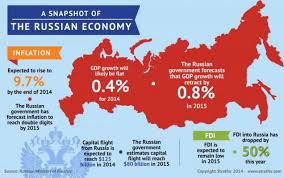Crisis in Ukraine can be considered as one of the decisive factors of international economy performance, not least of which is Russia’s economy. The West has sought to cut Russia off from the international economy from the moment the invasion started: the sanctions Washington and its allies have imposed are meant to strangle the world’s eleventh-largest economy. These sanctions included:
- Freezing assets abroad: Making and receiving payments: A major part of Rubles was frozen and that made it difficult for Russia to access its own money. Cutting off from global financial system: Russian banks got targeted by limiting their access to SWIFT international payment system, thereby hampering the ability of these institutions to undertake cross-border transactions.
- Cutting off from global financial system: Access to the SWIFT international payment system and resources was denied to the Russian banks due to which they were unable to carry out cross border transactions.
- Targeting energy exports: Sanctions were imposed on Russian distillate exports, which has been a significant means of exports for the Russian.
These measures were labeled by western officials and commentators as “crippling”, “debilitating” and “unprecedented. ” Despite this rationale, the effects of the sanctions on the Russian economy are far from simple and straightforward.
The Initial Shock and Predictions of Collapse
When the sanctions were imposed, there was a direct impact on the Russian Ruble and believed to be in the worst economic slump. Some economists said that the economic growth (GDP) would worsen area and inflation rate increases.
However, the Russian government took steps to mitigate the impact of the sanctions, such as:However, the Russian government took steps to mitigate the impact of the sanctions, such as:
- Raising interest rates: To halt rubles’ decline, the Central Bank of Russia has increased interest rates considerably.
- Capital controls: State authorities made capital controls so that the money did not flowed out of Russia.
- Increasing focus on domestic market: As the economy started maturing, focus was directed towards strengthening and developing the internal market and decreasing dependence on imports.
These measures and, moreover, the growth of the global oil prices contributed to stabilisation of the ruble and support of the government revenue.
The Current State of Russia’s Economy: A Mixed Bag
even as the underlying surprise of the approvals has died down, Russia’s economic system is as yet confronting big problems. here’s a breakdown of the continuing situation:
- GDP Growth:
- there was a withdrawal of Gross home product in 2022, but not pretty as extreme as at first expected.
- The IMF (worldwide monetary Asset) presently gauges a similarly decrease in 2024, yet at a greater sluggish velocity.
- Inflation:
- expansion rose strongly following the assents, however has for the reason that began to descend.
- though, growth is as but a prime pressing problem for Russian households.
- Energy Exports:
- irrespective of assents, Russia has had the choice to divert a portion of its electricity merchandise to new commercial enterprise sectors, mainly China and India.
- notwithstanding, in popular commodity volumes have declined, and Russia is logical getting decrease costs for its oil because of approvals.
- Long-Term Impact:
- The drawn out impact of the approvals on Russia’s financial system is as but questionable.
- Sanctions are probable going to spoil Russia’s financial improvement and mechanical development lengthy into the future.
- The takeoff of severa Western businesses from Russia will likewise have an adverse consequence.
Here’s a table summarizing the key economic indicators for Russia:
| Indicator | 2021 | 2022 | 2023 (Forecast) | 2024 (Forecast) |
|---|---|---|---|---|
| GDP Growth (%) | 4.3 | -2.1 | -1.5 | -2.0 |
| Inflation (%) | 8.4 | 17.0 | 12.0 | 8.0 |
| Unemployment Rate (%) | 4.9 | 4.0 | 3.8 | 4.2 |
drive_spreadsheetExport to Sheets
FAQs on Russia’s Economy under Sanctions
1. Will Russia’s economy collapse?
The answer is uncertain. at the same time as the sanctions have absolutely triggered considerable harm, Russia’s economy has shown some resilience. however, the lengthy-term effect of the sanctions stays to be visible.
2. How are ordinary Russians affected by the sanctions?
ordinary Russians have faced growing expenses for critical items because of inflation. There are also concerns about process security as Western organizations go away the country
3. Can Russia find new markets for its energy exports?
Russia has been able to redirect a number of its exports to China and India, however it’s far possibly receiving decrease fees for its oil. locating new markets for its tremendous natural gasoline reserves may be extra tough.
4. What are the long-term implications of the sanctions for Russia’s economy?
The sanctions are probable to hinder Russia’s monetary boom and technological improvement for future years. The departure of Western groups may even have a bad effect.
Conclusion: A Clouded Future for Russia’s Economypen_spark
The impact of sanctions on Russia’s economy has been a mixed bag. whilst the initial surprise changed into severe, the economic system has shown some resilience within the short term. however, the lengthy-term outlook stays unsure. Sanctions are probable to continue to impede Russia’s economic boom and technological development. The struggle in Ukraine additionally adds further strain, with the full fee of the conflict yet to be realized. most effective time will inform how deeply those challenges will scar Russia’s financial system.




